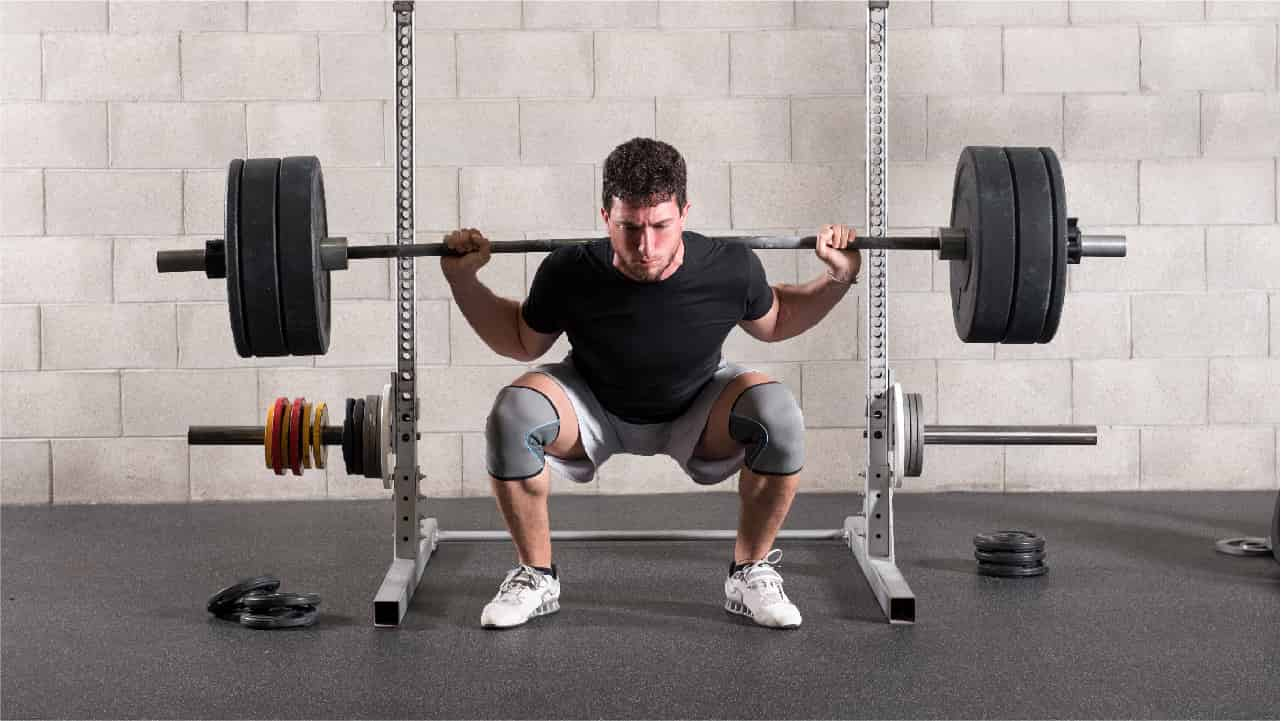As beach body season closes in, fat loss and weight loss are high on the summer goals ‘to-do’ list.
We’re all looking to trim down, shape up, and let those muscles pop.
If you’re one of the bunch looking to lose weight, lose a few pounds, lower that body fat percentage —or maybe even gain muscle without gaining fat—chances are you’ve heard that training on an empty stomach is the best way to do it.
While there may be some merit to back up fasted exercise, if you’re looking to gain muscle it may not be the most ideal route to go. To build muscle, you need a big enough training stimulus to cause damage to the muscle fibers. And to do that, you’re probably going to want fuel in the tank.
Although it’s not a deal-breaker, when it comes to a fasted workout, there are details to consider. With that in mind, we’re breaking down everything you need to know about fasted strength training —the pros and cons of fasted exercise, and how to maximize your energy if you’re training sans the fuel.
The Pros And Cons Of Fasted Training: Pros
Greater fat oxidation

This one is a big ‘if’ because there’s more to it than meets the eye. Most people are under the impression that if they exercise on an empty stomach, they burn more fat.
It’s one of the reasons intermittent fasting is having a moment in the limelight. The thinking is that because their body doesn’t have an immediate source of energy to pull from, it will pull from stored fat.
Although there is some truth to this, and several studies have shown you can burn up to 20% more fat training in a fasted state, it all depends on what you’re doing.(1)
Most reports show that cardio when fasted is effective to elevate fat burn, but other types of training may not to the same degree. Studies also agree that carbohydrate ingestion before low-intensity aerobic exercise inhibits the entry of long-chain fatty acids into the mitochondria, which blunts fat oxidation.(2-4)
That said, decreased reliance on carbohydrates for fuel during fasted exercises tends to increase free fatty acid oxidation. When adrenaline and cortisol levels are high and insulin is low, your body is better at using fat as fuel. But, after eating, insulin levels increase, which reduces the body’s ability to burn fat.(5, 6)
Keep in mind though, that this is only true for low-intensity exercise.
Better endurance
Ample studies show that fasted training can, over time, increase VO2max—a measure of your body’s oxygen utilization capacity during exercise. One study looked at the effect of caloric restriction and overnight fasting on cycling performance.(7)
They found that the rate of perceived exertion was significantly lower and the power-to-weight ratio (PWR) was significantly higher after 40% caloric restriction.
There was also an improvement in body composition—weight, fat mass, and body fat percentage all decreased while lean mass was maintained. The use of stored fat as an energy source during endurance activities contributed to these improvements. Caloric resection also did not decrease submaximal or maximal cycling performance after 3 weeks when combined with overnight fasting. Another study found that both men and women who fasted saw significant increases in training-induced VO(2max) and resting muscle glycogen concentration compared to the fed group.(8)
Increased growth hormone
Fasting and exercise have both been shown to increase levels of human growth hormone (HGH).
But what’s interesting is that just two days of fasting can boost the 24-hour endogenous GH production rate by 5-fold, which helps in utilizing stored fat as an energy source.(9) That said, growth hormone isn’t the be-all-end-all for muscle growth, but rather plays a key role in converting stored fatty acids and glucose into energy. If you’re lifting weight fasted, you may signal to your body to maintain lean muscle tissue, but it’s not going to help you gain huge amounts of it. Evidence suggests that growth hormone doesn’t help build lean muscle(10) —if you want to do that, you need the building blocks (amino acids) and a stimulation (resistance exercise).
The Pros And Cons Of Fasted Training: Cons
Muscle loss

One of the biggest things people worry about with fasted weight training is muscle loss—and it’s a valid concern.
Cardio and other high-intensity endurance activities increase the rate of proteolysis, AKA muscle breakdown. Relying on stored fat for energy can further exacerbate muscle breakdown and may negatively impact performance, blood glucose levels, and the immune system.
One study found that nitrogen losses were more than doubled when training in a fasted state ( glycogen depleted) compared with glycogen loaded, which resulted in a protein loss of roughly 10.4% of the total caloric cost of exercise after just one hour of cycling at 61% VO2max.(11) Fasted strength training isn’t any better. Although you’re boosting levels of growth hormone, there are no amino acids—especially leucine, the major signaling amino acid—to signal to your body to maintain or build muscle.
If you want to gain muscle, you need to be consuming amino acids close to when you train. So, if you’re looking to maximize muscle growth, fasted weight training isn’t the best idea.
High stress
Although exercise is incredibly beneficial for the body, it’s still a form of stress. And so is fasting.
When applied appropriately, stressors like fasting and exercise trigger hormetic responses, which are beneficial adaptations to stress. However, relying on stored fat for energy during fasted workouts can lead to reduced performance, muscle breakdown, and potential negative impacts on blood glucose levels and the immune system. When you place stress on your muscle fibers with heavy resistance training, they adapt, they’re repaired, and they get stronger (this is how you make strength gains).
And although the body has a pretty good system for dealing with stress, it does have a cap. If you exceed its capacity to manage stress, you could be doing more harm than good.
In response to exercise, the adrenal glands secrete cortisol, which results in a few changes:
-
Decreases muscle protein synthesis
-
Increases catabolism (affects carbohydrate, fat, and protein metabolism)
-
Stimulates gluconeogenesis in the liver
But compared to people consuming food before training, cortisol levels are higher in those who exercise after an overnight fast.(12)
Chronically high levels of cortisol can result in abdominal fat accumulation, reduced insulin sensitivity, increased risk of osteoporosis and hypertension, suppressed immune function, and less muscle mass.
Additionally, intense workouts like heavy weightlifting and sprints, can spike adrenaline—a stress hormone that can temporarily raise blood glucose levels by prompting the liver to release glucose. This shows why it’s critical to balance your workout’s intensity with your body’s metabolic reactions, particularly for those keeping an eye on blood glucose levels. What and when you eat before exercising matters too. Eating too many carbs before your workout can cancel out the benefits of dropping blood glucose levels, making it clear that smart nutrition planning isn’t just helpful—it’s essential.
Low energy
Certain types of training require substantial amounts of effort to receive maximum benefits.
When you’re training in a fasted state, especially with heavy lifts, it can be challenging to muster up the energy to give it 100%. Relying on stored fat for energy can lead to reduced performance, muscle breakdown, and potential negative impacts on blood glucose levels and the immune system. That said, studies show that time-restricted feeding doesn’t affect maximal strength or muscle maintenance.(13)
But for prolonged endurance activities, fasting isn’t ideal to maintain energy.
Is Weight Training On An Empty Stomach Bad?

There’s a lot of contradictory information out there and experts that believe you should never train fasted if you want gains, and those who believe fasted training is a gift from the Gods.
If you want a more reasonable approach, find a middle ground. For those practicing intermittent fasting, consider both the intensity of workouts and the specific body fat goals. However, relying on stored fat for energy can lead to reduced performance, muscle breakdown, and potential negative impacts on blood glucose levels and the immune system.
If you’re doing fasted, low-intensity activity for 30 minutes, chances are you’ll be fine and you may burn more fat than if you were to do the same activity fed.
But if you’re ramping up the intensity of your training and looking to maximize muscle gains, eat something before you train. It not only gives you the energy to get through your session but also prevents muscle breakdown and reduces overall stress levels.
Need An Energy Boost? Try This!
If you’re set on training in a fasted state and need a quick hit of energy, there are a couple of routes you can go. However, relying on stored fat for energy can have potential drawbacks such as reduced performance, muscle breakdown, and negative impacts on blood glucose levels and the immune system. For pre-workout power, a good energy supplement can be super beneficial for igniting your boosting energy levels to power you through an intense workout. Performance Lab® Energy is designed to supercharge your performance with stim-free energy.

Unlike conventional pre-workouts or energy supplements that mega-dose caffeine and can leave you feeling less than your best, especially on an empty stomach, Energy is completely stim-free. It features MicroActive® Q10, BioPerine®, BioPQQ®, and Bio-Enhanced® nutrition technology for a smarter, cleaner, and healthier energy boost. Energy is designed to enhance your cells’ natural energy production via supporting mitochondria—the powerhouses of your cells. It’s an ultra-clean, smart stack combining the most advanced nutrients for a safe, natural spark in energy.
Two capsules taken 45-60 minutes on an empty stomach pre-workout provides you with a stim-free boost to power you through your workout. No caffeine, no additives, and no crash.
And when you’re done training, Performance Lab® Recover is the world’s smartest muscle fuel to accelerate your recovery.
Featuring a fine-tuned dose of KarboLyn® and Oryzatein® organic brown rice protein, Recover leverages synergy between the most powerful post-workout ingredients to burn fat and build muscle.
Recover is about more than just carbs and Recover delivers ultra-modern nutrition designed to fast-track your recovery and repair muscle damage better than any other recovery product on the market.Recover helps you over crashes and reduces power output that can happen mid-workout and muscle energy depletion that happens without adequate pre-workout fuel. Instead, you’re getting highly bioavailable protein that stimulates muscle repair faster and more efficiently.
It’s the ultimate nutrition to power you through training and kickstart your recovery.
Sign up to be first to know when Performance Lab® Recover is back in stock.
References
-
Gonzalez JT, Veasey RC, Rumbold PL, Stevenson EJ. Breakfast and exercise contingently affect postprandial metabolism and energy balance in physically active males. Br J Nutr. 2013;110(4):721-732.
-
Ahlborg G, Felig P. Influence of glucose ingestion on fuel-hormone response during prolonged exercise. J Appl Physiol. 1976;41(5 Pt. 1):683-688.
-
Ivy JL, Miller W, Dover V, et al. Endurance improved by ingestion of a glucose polymer supplement. Med Sci Sports Exerc. 1983;15(6):466-471.
-
Spriet LL, Watt MJ. Regulatory mechanisms in the interaction between carbohydrate and lipid oxidation during exercise. Acta Physiol Scand. 2003;178(4):443-452.
-
Zouhal H, Saeidi A, Salhi A, et al. Exercise Training and Fasting: Current Insights. Open Access J Sports Med. 2020;11:1-28.
-
van Loon LJ, Koopman R, Stegen JH, Wagenmakers AJ, Keizer HA, Saris WH. Intramyocellular lipids form an important substrate source during moderate intensity exercise in endurance-trained males in a fasted state. J Physiol. 2003;553(Pt 2):611-625.
-
Ferguson LM, Rossi KA, Ward E, Jadwin E, Miller TA, Miller WC. Effects of caloric restriction and overnight fasting on cycling endurance performance. J Strength Cond Res. 2009;23(2):560-570.
-
Stannard SR, Buckley AJ, Edge JA, Thompson MW. Adaptations to skeletal muscle with endurance exercise training in the acutely fed versus overnight-fasted state. J Sci Med Sport. 2010;13(4):465-469.
-
Hartman ML, Veldhuis JD, Johnson ML, et al. Augmented growth hormone (GH) secretory burst frequency and amplitude mediate enhanced GH secretion during a two-day fast in normal men. J Clin Endocrinol Metab. 1992;74(4):757-765.
-
Rennie MJ. Claims for the anabolic effects of growth hormone: a case of the emperor’s new clothes?. Br J Sports Med. 2003;37(2):100-105.
-
Lemon PW and Mullin JP. Effect of initial muscle glycogen levels on protein catabolism during exercise. J Appl Physiol. 1980;48: 624-629.
-
Kim TW, Lee SH, Choi KH, Kim DH, Han TK. Comparison of the effects of acute exercise after overnight fasting and breakfast on energy substrate and hormone levels in obese men. J Phys Ther Sci. 2015;27(6):1929-1932.
-
Moro T, Tinsley G, Bianco A, et al. Effects of eight weeks of time-restricted feeding (16/8) on basal metabolism, maximal strength, body composition, inflammation, and cardiovascular risk factors in resistance-trained males. J Transl Med. 2016;14(1):290.














